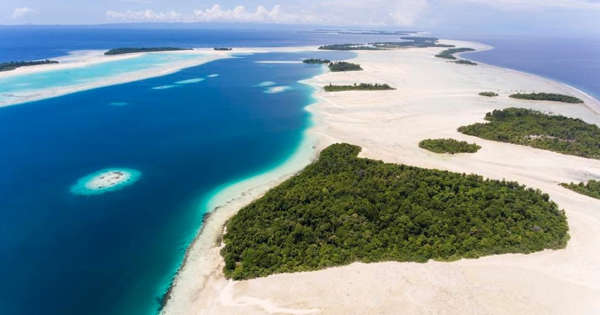“The opportunity of a lifetime awaits,” declares the Sotheby’s auction page, next to a photo of lush green atolls surrounded by white sand beaches and turquoise blue sea.
The Widi Reserve is a stunning, currently uninhabited archipelago in eastern Indonesia consisting of about 100 islands in a 315,000-hectare Marine Protected Area.
According to Sotheby’s, it is “one of the most breathtaking properties anywhere on Earth”.
The winner of the week-long online auction, which starts on Thursday, will get to buy a stake in the company with the rights to develop this slice of paradise.
However, environmental groups are concerned the project will erode the pristine area’s environmental value.
PT Leadership Islands Indonesia (LII), which was granted a 35-year lease to develop the archipelago in 2015, plans to build up to 500 “eco-residences” across 17 of the islands.
The plans include an airstrip for guests from around Indonesia and overseas.
Bidders in the Sotheby’s auction will be required to pay a $100,000 deposit on top of “a legally binding commitment letter to invest a significant amount into the development” of the land.
“The winning bidder will acquire share equity interests in LII, together with the current leadership team,” the LII spokesperson told ABC.
The spokesperson said they had commissioned Sotheby’s to conduct the auction to find investors.
“We understand that it is an unusual process,” the spokesperson said.
“LII is a unique company seeking to implement a unique project, so why not pursue a unique capital raising process?”
Indonesian law doesn’t allow for private ownership of islands.
Instead, ministry of marine affairs and fisheries spokesperson Wahyu Muryadi said leasing whole islands was common practice.
Mr Muryadi said the company’s effort to find investors was legal as long as it followed the regulations around partnership and capital investment.
‘Low-footprint, high-value eco-tourism model’
The LII spokesperson said the vision for Widi Reserve was for it to become “one of the world’s most sustainable luxury travel destinations with a low-footprint, high-value eco-tourism model”.
However, Greenpeace Southeast Asia campaigner Afdillah (who only goes by a single name) said there were concerns “privatisation” of the islands would ruin the biodiversity of the area.
“The [archipelago] is located in the ‘coral triangle’, a strategic area for conservation and where key populations of manta rays, whale shark and tuna live,” he said.
“The living cycle in the area, especially its stability, will be disrupted if suddenly humans come with tourism activities and infrastructure developments, like building harbours, villas and pools.”
Afdillah said that just because the archipelago was “uninhabited” did not mean it did not belong to anyone.
“There is no place in Indonesia that doesn’t have an owner,” he said.
“Although the people don’t live there, these islands may become plantation land or resting spot for the fishermen when the storm happens.
“The sea around the island could be the key areas for them to catch fish.”
International maritime expert Shiskha Prabawaningtyas said she was concerned the developer’s need to make money would overcome the desire to maintain the environment.
Dr Prabawaningtyas, the director of the Paramadina Graduate School of Diplomacy, added that the government should ensure the company followed through on its commitments to sustainability.
“Even though the island is uninhabited, they must make sure … [the development] is connected to the historical function of the island, of its social, cultural, politics, and economy,” she said.
“Because if they enter the scene without collaboration, there will be potential of conflicts along the way, just waiting for the trigger.”
Approvals under review
Meanwhile, amid public concern that rights to Indonesian islands were being sold off to foreigners, the government is reportedly reviewing LII’s development approval.
According to local media reports, the company now needs to jump through further administrative hoops within the next six months or risk having its permits revoked permanently.
In a statement, LII said the Sotheby’s auction would go ahead anyway.
“LII has engaged Sotheby’s Concierge Auctions to facilitate the auction, and as of today, the auction is still scheduled,” it said.
“LII has not received any formal legal notice about the suspension of any of its licenses and has and will continue to engage with key stakeholders to assure them that the process is above board.
“These include positive outcomes from numerous meetings with several government agencies, the latest of which was held on Tuesday, the 29th of November 2022.”
The statement also reiterated the company’s intention to develop the archipelago sustainably.
“LII’s master plans are designed around a ‘high value, low footprint’ eco-tourism model to ensure the long-term preservation of this national asset which will be open to the general public and carefully managed to minimise environmental damage,” the statement said.
“LII has attended several community socialisations to ensure that local fishermen communities are involved and informed and played an active role in the Widi Reserve becoming a Marine Protected Area over a several year process.”
Afdillah said he was aware LII was having permit issues and hoped the government would block the project.
“The small islands shouldn’t be managed by private companies because its ecological functions are more important than business interests,” he said.
“Small island areas are also very vulnerable to climate disaster, and if the investors insist to invest there, they will experience loss at the end of the day.”
